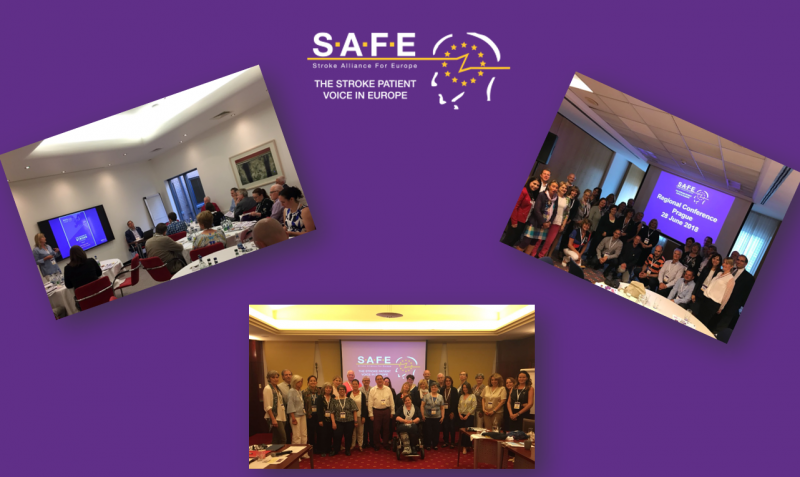
May 3, 2019
This year, SAFE Regional Conferences will be held in Paris on Thursday May 9th, Krakow on Wednesday June 12th and Stockholm on Wednesday June 26th.
SAFE member organisations from 30 European countries will gather within their clusters to discuss the following items:
- A review of SAFE’s work, including the updating of its strategy and a discussion of its relationship with, and activities addressing the importance of co-morbidities
- Discussion of the implementation of the Stroke Action Plan for Europe, focusing particularly on work that can be done in each country and stakeholder engagement and partnership in advocacy
- An update on the Romanian Presidency event
- Translations of materials and promotion of the prevention website
- Utilisation of the SSOFT website to enable growth of SSOs and more effective advocacy
- Preliminary findings and messages arising from the Economic Impact of Stroke research
- SAFE Research Projects
- SAFE and World Stroke Day 2019
- Round-up of activity from attending members
SAFE is thankful to Boehringer Ingelheim for the continued sponsorship of our Regional Conferences.
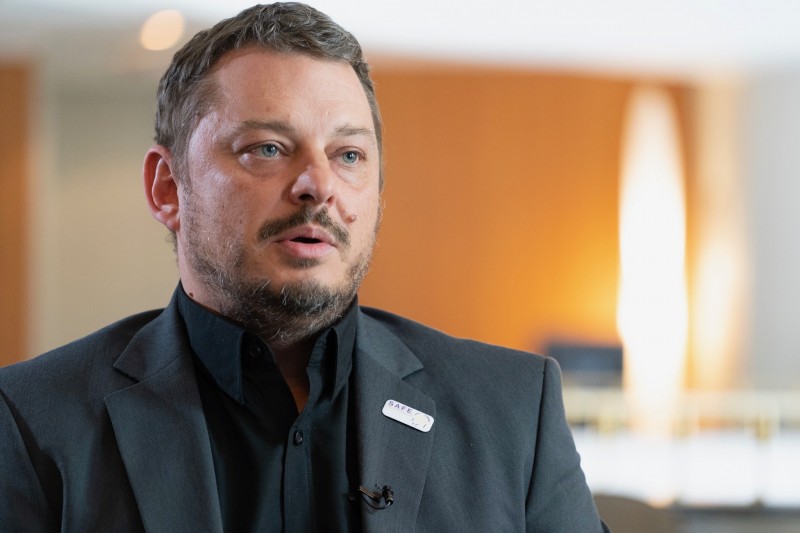
May 3, 2019
“Our country is small in population, around 7 million in total, but we are among the countries with the highest stroke incidence. Approximately 25.000 strokes occur every year in Serbia. With numbers as high as this, a person would think that we are getting closer to a solution of how to take care of those who survive stroke, but the reality is- we are still very, very far from it. As the Stroke Action Plan for Europe 2018 – 2030 stated, the issues that stroke survivors are facing long term have historically been ignored, and this is what we are hoping to see changed, with the implementation of this Plan, over the next 10-12 years” says Dr Ivan Milojević, Vice President of the Serbian stroke organisation “Moždani udar” and SAFE Board member.
SAFE: What is one issue related to the life after stroke in your country that you think needs special attention?
IM: One of the basic things we consider as the biggest problem in Serbia is the nonexistence of an organized service which would deal with patients after stroke. In our country there is a rehabilitation that involves active participation of medical institutions up to 3 months after stroke and later after that patients are left on their own, or to their families. Even if there is an early rehabilitation provided shortly after stroke in the stroke units, and rehabilitation provided later after that in rehabilitation centres and specialized physical rehabilitation facilities, that is not enough, and stroke survivors long term needs for rehabilitation after stroke are not satisfied. Apart from regular check-ups by a neurologist, there are no other forms of organized monitoring of stroke survivors.
SAFE: What would be the solution, i.e. what is your organisation’s position regarding this issue?
IM: One of the main ideas that led to forming our association was, among others, about finding a way to organise stroke survivors’ gatherings, so they could share their experiences as peer to per support, and to include them in social activities. We tried to form Stroke clubs, and we are still working on finding the most suitable way to organise this activity. Unfortunately, this is not easy, because our organization is small and doesn’t have financial susatainability that would enable us to have our own space or to rent one for this type of gatherings. Our association has an active two-way communication with stroke survivors via our social network pages. They share with us their stories and we share them through our website and social media channels. We hope these stories might inspire and encourage other stroke survivors to overcome their problems. In that way, and by organizing public campaigns and actions, we are helping the voice of patient to be heard.
SAFE: Please tell us more about your organisation.
IM: Association “Moždani udar” was founded on 30th July 2012 as an NGO. As representatives of stroke patients, we are dedicated to raising awareness of all aspects of stroke. We are involved in many activities and campaigns that cover primary prevention, stroke symptoms early recognition, stroke treatment, rehabilitation, and life after stroke. We were and are part of European and World stroke campaigns, as well as some of the most prominent European projects (Angels Initiative, Stroke Support Organisation Faculty Tool – SSOFT etc). We also share an up-to-date progress information of EU funded stroke research projects by disseminating materials on our language.
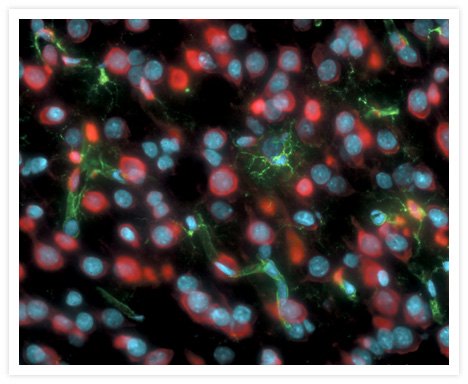
Apr 30, 2019
The University of Luebeck is coordinating a new Marie Curie Innovative Training Network called “ENTRAIN”. The project is being funded by the EU commission with 3.6 Mill Euro. Thirteen partner organizations from academia and industry in 9 European countries will be investigating inflammatory processes in the brain, especially those associated with stroke, Alzheimer disease and multiple sclerosis. ENTRAIN follows the project “nEUROinflammation”, which had been funded by the EU since 2013 and was successfully completed in 2017.
The results of nEUROinflammation lead the group to investigate the interactions of specific cell types in the brain, called endothelial cells and microglia, in the current project. The outcome has the potential to improve the therapy of stroke, Alzheimer disease and multiple sclerosis.
The international project will run for 4 years. It aims to support the education of PhD students and to strengthen scientific cooperation in Europe. All in all, 14 postgraduates will work in the research institutions of the partners and participate in workshops and trainings. They will also spend up to 6 months in other partners’ laboratories.
The consortium members of „ENTRAIN“ include the University of Luebeck (Germany), the University Bern (Switzerland), the Westfälische Wilhelms-University Münster, the University Medical Center Freiburg, the Eidgenössische Technische Hochschule Zürich (Switzerland), Stichting VUMC (Netherlands), the Hungarian Academy of Science (Hungary), die Universita Degli Studi di Brescia (Italy), die Universite de Caen Basse-Normandie (France), the Istituto di Ricerche Farmaco-logiche Mario Negri (Italy), the University of Helsinki (Finland), the Agenca Estatal Consejo Superior de Investigaciones Cientificas CSIC (Spain) as well as the company Mimetas BV(Netherlands). The research consortium will be supported by the companies Boehringer Ingelheim GmbH & Co. KG, Brendinn Therapeutics, Dualsystems Biotech AG and Polygene AG as well as the patient organizations Incontinetia Pigmenti France und Stroke Alliance for Europe. Leading experts from these institutions will supervise the PhD students.
Prof. Dr. Markus Schwaninger, Institute for Pharmacology and Toxicology, University of Luebeck, will serve as project coordinator. Susanne Zimmermeier will cover administrative aspects and Dr. Walter Häuser will organizes trainings and workshops for the PhD students; both are also located at the Institute for Pharmacology and Toxicology, University of Luebeck.
Overall there are 14 individual projects involving 14 postgraduates. Two of these projects are based in the Institute for Pharmacology and Toxicology at the University of Luebeck: „Brain macrophages in the remodelling of microvessels“under the supervision of Markus Schwaninger and „Brain endothelial signalling and its regulation by myeloid cells“ under the supervision of Jan Wenzel.
The project starts on May 1st, 2019. At that time the new homepage www.itn-entrain.eu will be launched. There you can find details of the project and candidates will have the possibility to apply online.
The Marie Skłodowska-Curie actions gives universities, research institutions and industrial companies the opportunity to apply for a funding to set up a European network for the structured education of young researchers to support cross-border and cross-sectoral mobility of researchers and to improve their career advancement and knowledge exchange.
The featured image description and credits: Capillary endothelial cells and microglia in a rat brain cryosection, website ThermoFisher Scientific.
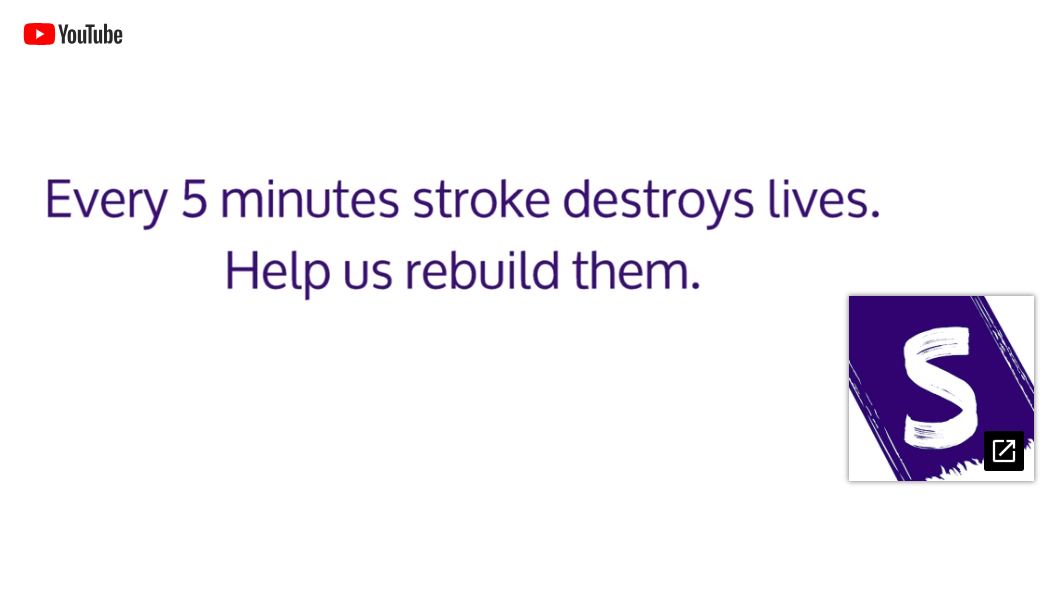
Apr 29, 2019
Too many people affected by stroke aren’t getting the support they need. As a charity, the Stroke Association UK knew they needed to reach more people.
On Friday 26 April they have launched their first ever TV-led marketing campaign, Rebuilding Lives.
Rebuilding Lives is aimed to change the way people think about stroke using the real life stories of stroke survivors. Told in their own words. Unscripted. Unfiltered. It is directed by award-winning director Lotje Sodderland, who is herself a stroke survivor. The stories told show that stroke can strike anyone at any time, changing lives in an instant, but that life after stroke is possible. With the right specialist support and a ton of courage and determination, people can recover and adjust to a new normal. The Stroke Association is there to support people to rebuild their lives after stroke.
For more information, please visit https://www.stroke.org.uk/rebuilding-lives
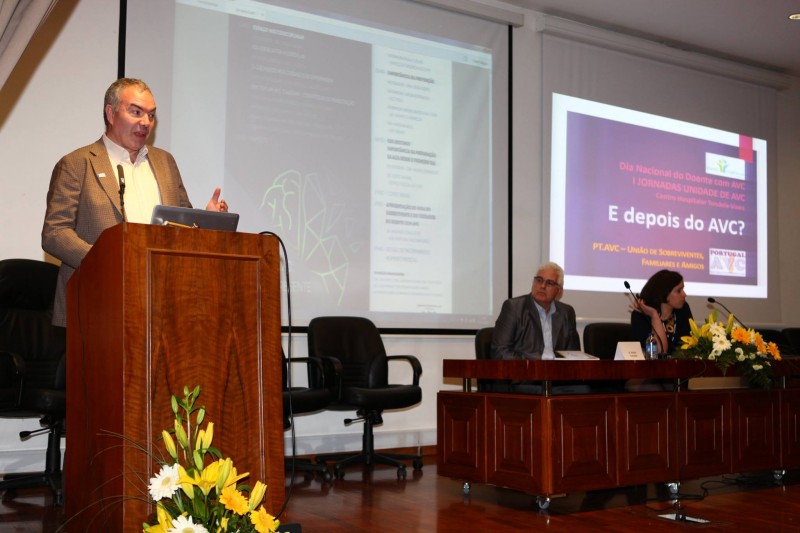
Apr 25, 2019
“Currently, in Portugal, when a stroke occurs, the first phase of treatment, the acute phase, happens in similar conditions to the ones of the best practices in Europe. The first rehabilitation, still within a hospital circle, is already implemented with great differences across our country, and, on average, isn’t as satisfactory. After… when the real life after stroke begins, the survivors and care givers, generally, feel alone, helpless! It’s mostly in that moment, when the biggest problems start (including the psychological, socioeconomic, life reorganization, etc. ones), that, in most cases, there are flaws. Not only in the continuity of the strictly therapeutic recovery, but also in the social and psychological support, among others…” says António Conceição, President of the Portugal AVC, a stroke support organisation that is part of SAFE.
SAFE: What is one issue related to the life after stroke in your country that you think needs special attention?
AC: In Portugal, above all, it’s necessary to remind people, specially people with influence (not only political but other), that survivors have a life after stroke! That they can be active and useful citizens just like everyone else. And an essential contribution for that is making rehabilitation possible and accessible to everyone, as well as making it starts fast, timely and multidisciplinary (since it needs to involve multiple medical and therapeutic areas, that don’t restrict themselves to the physical or motor situation).
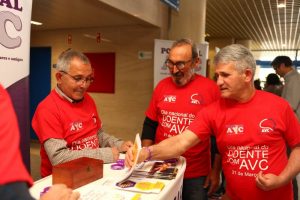 SAFE: What would be the solution, i.e. what is your organisation’s position regarding this issue?
SAFE: What would be the solution, i.e. what is your organisation’s position regarding this issue?
AC: Our procedure, especially in our possibilities of public intervention, has been directed towards two themes: life after stroke and the defense of a better rehabilitation. Recently, we celebrated in Portugal the National Day of Stroke Survivor (31st March). All of our communication, including the one on social communication, followed this line of work: the defense of a fast, timely and multidisciplinary rehabilitation. We pointed out some very concerning flaws. The Portuguese Stroke Society (a medical and scientific organization) also followed an identical theme in its communication. Furthermore, the president of this society, a very prestigious person, said a sentence, a few years ago, that we also repeat many times: “Rehabilitation isn’t a charity, but a right! If needed, during the entire life!” We have conscience that our action has contributed to give prominence to this subject too.
Deeply connected to this theme is the defense of life after stroke, with the maximum quality possible, and the Action Plan for Stroke, by giving the proper importance to life after stroke, has helped us in this struggle. In Portugal, for initiative of the Portuguese Stroke Society, we are working on adapting this plan to our national situation. Unfortunately, we are aware that our action is only starting…
SAFE: Please tell us more about your organisation.
AC: Portugal AVC is a national association, made of stroke survivors, but also of caregivers and health professionals, founded in September 2016. Working like this, we have been functioning very well.
We have, as statuary goals, to contribute to the prevention of stroke and to respond to the needs felt by stroke survivors and their caregivers. And we defined three areas of action as priority:
– Making information available, about all “stages” of stroke, from the prevention to the life after stroke.
– To be the voice of survivors and caregivers, in the government entities and social communication.
– Mutual help. By giving answer to the multiple requests we receive, including by telephone, email, Facebook, … But also, we have promoted and supported the appearance of Support Groups (GAMs). We have already 14, in different places in the country.
Among other activities, we highlight the “Portugal AVC Meetings”. They are moments of interaction with the survivors, caregivers and health professionals, that have had a strong adherence and fantastic environment. We already organized seven, always in different locations, from the north to the south of the country.
However, we are aware that, considering the needs, we are only beginning…
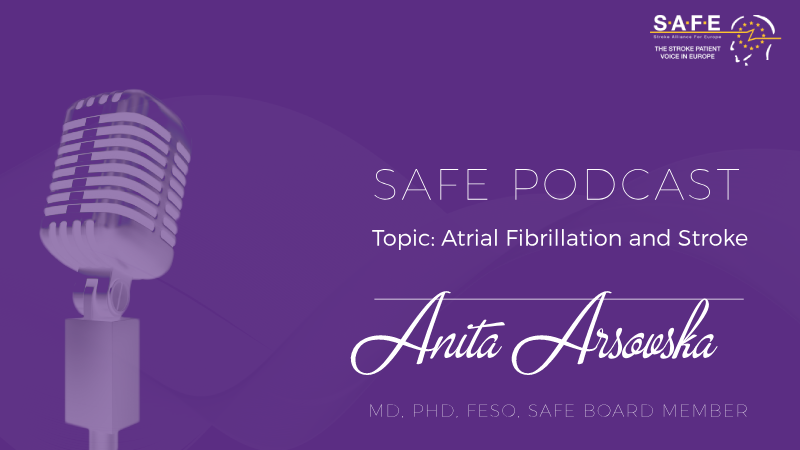
Apr 23, 2019
Atrial fibrillation (AF) is an irregular heart rhythm with rapid and irregular beating. It is estimated to increase the risk of stroke 3 to 5-fold and to be associated with around a quarter of all ischaemic strokes. Additionally, AF is associated with more severe strokes leading to higher mortality and disability. We have discussed this topic with Prof. Dr Anita Arsovska, University Clinic of Neurology, Medical Faculty, University “Ss Cyril and Methodius”, Skopje, North Macedonia, FESO, SAFE Board Member.
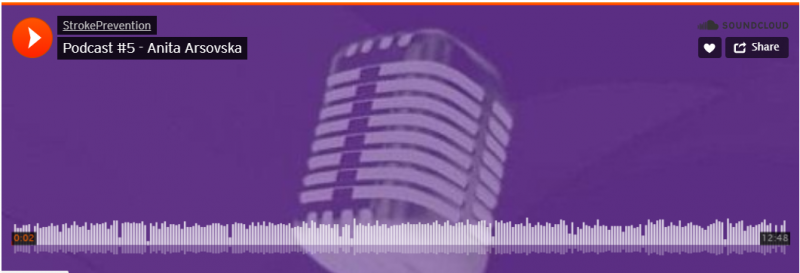






 SAFE: What would be the solution, i.e. what is your organisation’s position regarding this issue?
SAFE: What would be the solution, i.e. what is your organisation’s position regarding this issue?




